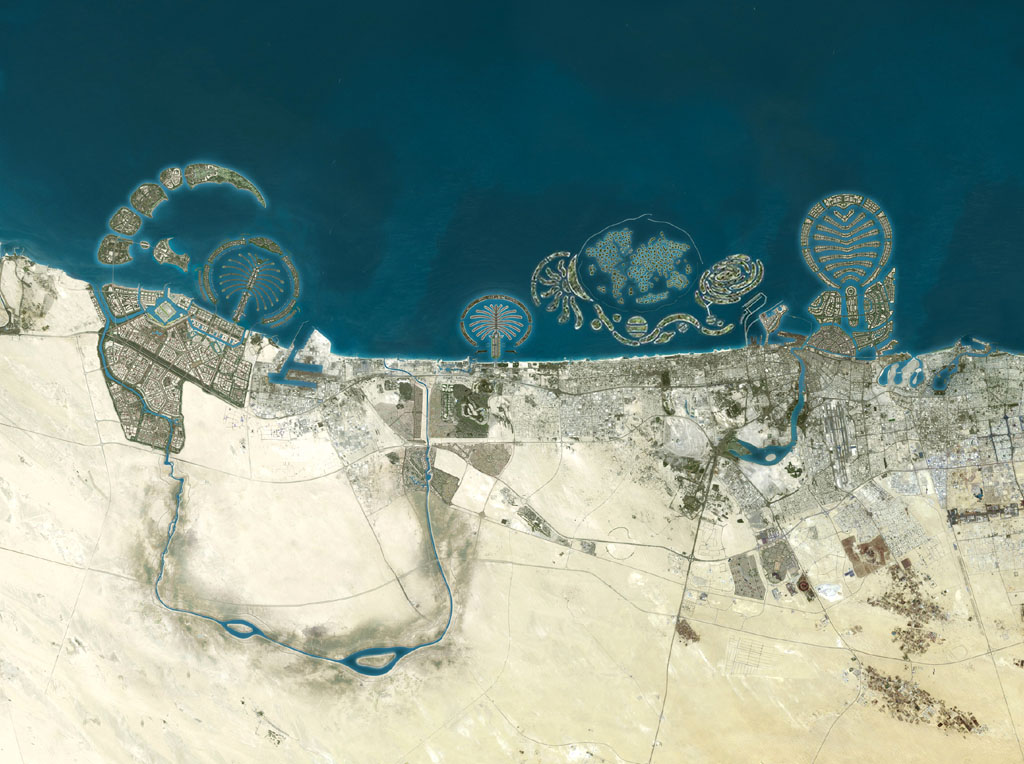16-07-08 // PSEUDO-DEMOCRACIES AND PSEUDO-COMMISSIONS – INTERVIEW WITH REINIER DE GRAAF

Dubai satellite image, ©OMA
Beatriz Ramo and Bernd Upmeyer spoke with Reinier de Graaf, who is one of the partners of Rotterdam-based OMA (Office for Metropolitan Architecture). He joined OMA in 1996 and in 2002 became the director for AMO, the think tank of OMA. In that capacity he was responsible for the production of ‘The Image of Europe’, an exhibition that provides a history of European political representation. Recently, he has taken responsibility for OMA’s growing engagement in the Middle East and leads several master plan projects in Dubai, including Waterfront City, Kuwait, and Ras-Al-Khaimah, and buildings in Dubai and Saudi Arabia. The interview deals in general with the question what it means for a European planner – being used to a democratic context – to design in the Gulf States ruled by absolute monarchies. Furthermore, it discusses what kind of urban conditions are being produced there and what impact those planning processes have on the Western world. More specifically, the interview deals with OMA’s Waterfront City project in Dubai.
Beatriz Ramo: At OMA you are currently busy with many projects in the Gulf Region. What is it like for a European planner, used to a democratic context, to design in states that are ruled by absolute monarchies?
Reinier de Graaf: There is a lot to say about the whole political dimension of where we are working at the moment. An engagement in a place that is not democratic is often equated with endorsement of non-democracies, or at best, it is equated with political indifference and opportunism. But actually, the choice of places where we work is quite deliberate, and as such very much the opposite of opportunism. As an architect you generally go where they build a lot, but at a certain moment we simply decided to explore the Eurasian continent and explore it to the fullest. A continent that geographically consists of about 20 percent democracies and about 35 percent dictatorships, but for the vast majority – the remaining 45 percent – it actually consists of what we have called: “pseudo-democracies”: places where they have elections, but where you know in advance who is going to win. It is a very slippery and dangerous phenomenon. At this moment the Pseudo-democracy seems to be the most prevailing political system on the Eurasian continent. In many ways it entails the end of black and white thinking about politics in general. Pseudo-democracies have a two-way effect: on the one hand they function as the easy option for dictatorships when faced with pressures for democratic reform, (since for dictatorships it is always easier to transform itself into a pseudo-democracy than into a democracy). So to some extent it inspires good behavior in dictatorships. But on the other hand, it also constitutes a kind of very gentle and subtle erosion of previously well established democracies. So both dictatorships and democracies are weirdly sliding into the same diffuse state… If things were once black and white – good and bad, they are increasingly drifting towards a kind of grey state in which even supposedly respectable democracies can give rise to somebody like Berlusconi.
BR: So could we say that Italy is a pseudo-democracy?
RdG: Clearly some of Berlusconi’s ongoing control of the Italian media while being in government has raised questions also inside EU nations about the robustness of the democratic political system. It is something we are acutely aware of. The question then is: what do you do? I must admit I always get a little annoyed that architects, simply because they are professionally active in other forms of political regimes, are the first whose integrity is called into question…
…the complete interview was published in MONU #9 on the topic of Exotic Urbanism on July 16, 2008.
Title: Pseudo-Democracies and Pseudo-Commissions
Project: Interview with Reinier de Graaf
Date: July 2008
Type: Commissioned interview
Topic: Exotic Urbanism
Organizer: MONU
Status: Published
Publications: MONU #9, P.94-107
Interviewer: Beatriz Ramo, Bernd Upmeyer